
The Japan Dietetic Association announced two commitments at the ”Tokyo Nutrition for Growth Summit 2021”. With Japan Nutrition, a century-long Japanese nutrition policy, we will work to eradicate malnutrition worldwide.

“The Nutrition for Growth Summit” was first held in London in 2012 as a forum for leaders from governments, international organizations, businesses, and civil society groups to discuss a wide range of issues related to improving the nutrition of people around the world in order to achieve the SDGs. Since then, it has been held in Rio de Janeiro, and on December 7 and 8, 2021, it was hosted by the Japanese government as the "Tokyo Nutrition for Growth Summit 2021”.
At the Summit, 396 commitments were submitted by 181 stakeholders, including 66 governments, 26 private companies, and 51 civil society organizations, totaling more than US$27 billion in nutrition-related funding. In addition, the “Tokyo Compact on Global Nutrition for Growth” was issued to end malnutrition by 2030, providing specific direction for future efforts.

Prime Minister Kishida delivers a speech at the "Tokyo Nutrition for Growth Summit 2021”: quoted from the Prime Minister's Office of Japan website
In the Compact, Prime Minister Kishida announced Japan's commitment to provide 300 billion yen, or more than US$2.8 billion, in nutrition-related assistance over the next three years, to share Japan's experience and knowledge, and to contribute to achieving universal health coverage. Furthermore, he declared: "Make people healthy and happy through the power of nutrition. These are the words of Mr. Teiji Nakamura, President of the Japan Dietetic Association. Japan will spread this desire to the world."
This is Teiji Nakamura, President of the Japan Dietetic Association.
Improving nutrition is essential to create a society in which all people can enjoy services for the promotion of health, prevention and treatment of diseases, and restoration of function without leaving no one behind. Nutrition also plays a role in supporting the entire SDGs from the bottom up. Registered dietitians and dietitians are the practical leaders in such nutrition improvement.
Before modernization and the introduction of nutritional science, the Japanese suffered from many nutritional deficiencies. It was during the starvation caused by World War II that the Japanese dietitian was born. Dietitians provided nutritional guidance at government agencies, welfare facilities, schools, and hospitals, and contributed to the creation of a society in which all citizens had access to healthy food and nutrition education in their daily lives. The Japan Dietetic Association, in cooperation with the government, has contributed to the improvement of the nutrition of the Japanese people by training and improving the quality of registered dietitians and dietitians .
We are pleased to announce our commitment at the ”Tokyo Nutrition for Growth Summit 2021” to contribute to international nutrition improvement by leveraging this experience.
With a target year of 2030, we will support the education and training of registered dietitians and dietitians, as well as the creation of a dietitian system and the establishment of a foundation for sustainable nutrition improvement in other countries, especially in Asia. For countries that already have a dietitian system, we will contribute to the eradication of malnutrition worldwide by supporting the development of human resources' skills through training, study abroad, and other programs.
Through the power of nutrition, let's make people healthier and happier.
Thank you very much.

The design of the symbol mark looks like a wing or a river, as it means “spreading to the nations (the world)”. The logo is divided into three colors to evoke the three components of the commitment: “human resources,” “structure,” and “education”. The three colors match the colors of Japan’s the “ three color food groups”. Japan Nutrition is from Japan, so the Japanese flag is used in the background.
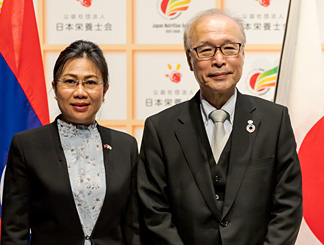
The Japan Dietetic Association held the ”Tokyo Nutrition for Growth Summit 2021”official side event at the Tokyo International Forum on December 7 and December 8, and streamed it online. Stakeholders, including the Ambassador of the Lao People's Democratic Republic (Lao PDR), gave presentations on their commitments.
In one or more countries, mainly in Asia, we will support the education and training of registered dietitians and dietitians, as well as the creation of a dietitian system and the establishment of a sustainable nutrition improvement infrastructure, starting with school lunch programs as the cornerstone of nutrition education.
October 12, 2022
The Lao government and the Japan Dietetic Association exchanged information on the nutritional status of the Lao people and Japan's nutrition policy to date, and discussed the possibility of cooperating with each other to launch a project to improve the nutrition of the Lao people.

December 20, 2022
Discussion with Professor Mayfong Mayxay, Vice President of the University of Health Science, on the current situation in Laos. They promised that the Japanese side would visit Laos next time to share awareness, exchange opinions, and promote personal exchanges on nutrition issues with Lao government officials, nutrition scholars, and university officials.
For one or more countries that have already trained and deployed dietitians, we will promote nutrition improvement by providing support for skill development of human resources.
December 6, 2022
Four advisors from the Asian Development Bank (ADB) and two researchers from IPB University, who are in a position to conduct research on school lunch and make proposals to the government, visited Japan. We cooperated in their visits to a school lunch site (Yokosuka City School Lunch Center) and a training facility for registered dietitians and dietitians (Kanagawa Human Services).

January 23-25, 2023
President Teiji Nakamura of the Japan Dietetic Association participated in "The 11th SSBN (Sensory Science for Better Nutrition) Special Seminar on Sensory Science for Nutrition" hosted by Institute of Nutrition, Mahidol University, Thailand, and gave a lecture to university and industry representatives.
During the Prince Mahidol Award Conference (PMAC), an international health conference to discuss important international health issues among leaders and stakeholders in the health and medical fields, we participated in the PMAC Special Talk Session "JAPAN NUTRITION for human and planetary health beyond climate change" organized by RESULTS Japan a nonprofit organization, as a co-organizer together with Thai Dietetic Association and Ajinomoto Co. Inc.


January 24-25, 2023
The conference "Child and Adolescent Nutrition in Indonesia" organized by the Asian Development Bank (ADB) was held at the Grand Melia Jakarta in Jakarta, Indonesia. The conference was attended by officials from the Ministry of Health, the National Development Planning Agency, and the Ministry of Religious Affairs from the Indonesian government, UNICEF, WFP, and the Indonesian office of the Japan International Cooperation Agency (JICA) from international organizations, and the Japan Dietetic Association from Japan.

August 19-21, 2022
2022The 8th Asian Congress of Dietetics (ACD2022) was held at Pacifico Yokohama in Yokohama, Japan. A total of 1,137 dietitians, nutritionists, and other experts from Japan and 17 other Asian countries gathered to discuss nutrition issues, countermeasures, and policies in their respective countries through 23 lectures, symposia, and workshops, as well as 272 poster presentations.

November 2-4, 2022
The Board of Directors of the International Confederation of Dietetic Association (ICDA) met in Toronto, Canada, November 2-4, 2022. Topics discussed included how to manage an international organization, the current status and issues of dietetic associations in each country and internationally, and standardization of education, training, and work.
December 6-11, 2022
The theme of the conference was "The Power of Nutrition: For the Smiles of 10 Billion People”, and nutrition issues were discussed at the Tokyo International Forum.
September 19, 2023
The “Japan-China Health and Nutrition Exchange Meeting” was held at the Okura Garden Hotel Shanghai under the auspices of the Japan-China Society of Health Science, the Consulate-General of Japan in Shanghai, and the Japan Dietetic Association, with the aim of helping Chinese people maintain and improve their health and prevent lifestyle-related diseases through dietary improvement and promoting exchange and trade between the food industries of both countries. Approximately 350 people attended. Nineteen companies, including Japanese companies in China such as Meiji (China) Investment Co., Ltd. and Nissin Oillio (China) Investment Co., Ltd. The main part of the event was a lecture by President Nakamura Teiji on "Contribution to Human Health and World Peace through Japan Nutrition".


“Japan Nutrition" means the following; Japan has solved malnutrition and created a modern nation of health and longevity by introducing nutritional science and nutrient-dense foods and cuisine since the Meiji era. In a manner of speaking, he succeeded in improving nutrition in a uniquely Japanese way by combining "culture and science." (From "Japan Nutrition, Unraveled by Nakamura Teiji," published by Daiichi Shuppan). Based largely on publicly available data from the Ministry of Health, Labor, and Welfare, here we reviews the 100-year history of Japan's nutrition policy, which combined "diet," "human resources," and "evidence" to leave no one behind. And that policy was developed before the increase in GDP and the increase in life expectancy.
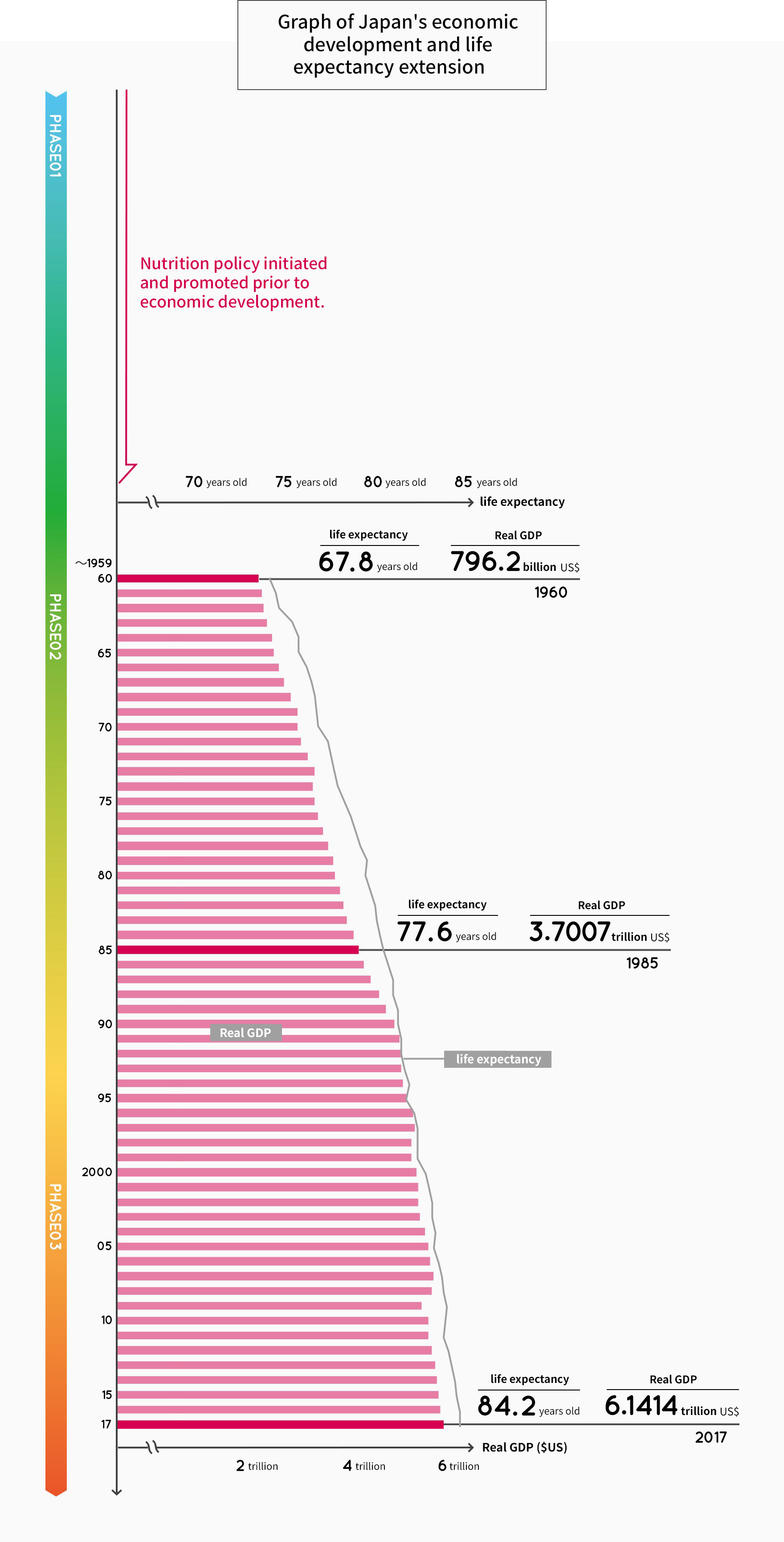
※Real GDP Source: World Bank (1960-2017) "GDP (constant 2010 US$), Japan (1960-2017)"
※Life expectancy Source: OECD "Life expectancy at birth (Total), Japan (1960-2017)”
※The following figures and text are quoted and arranged from “Japan‘s Nutrition Policy That Leaves No One Behind: Toward the Realization of a Sustainable Society“
(Published by the Office of Nutritional Guidance, Health Division, Health Bureau, Ministry of Health, Labour and Welfare).
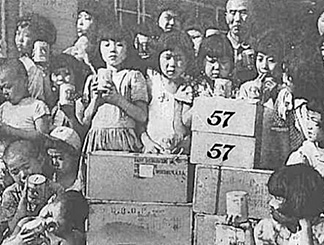
Japan has faced serious nutritional deficiencies many times in the past due to food shortages caused by cold weather and other climatic changes and emergencies. After World War II, with the support of international organizations and others, measures based on the results of nutrition surveys that began in 1945 were implemented by nutrition specialists and others throughout the country, and nutritional deficiencies were eliminated at an early stage.
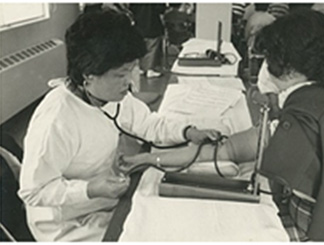
As Japan entered a period of economic growth, problems of excessive nutrition, such as obesity and lifestyle-related diseases, began to emerge. In response, the government took measures to combat lifestyle-related diseases by promoting community-based improvement policies for nutrition through "National Health Promotion Measures," which centered on the expansion of health checkups and health guidance, human resource development, and facility improvement.
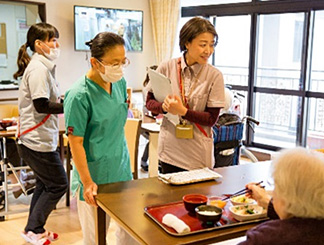
With the further development of an aging society with a declining birthrate expected, and with the aim of realizing a vibrant society, the Dietitians Law was revised in 2000. With this law, advanced and detailed nutrition policies are being promoted in the areas of medical care, nursing care, welfare, schools, and administration by enhancing various systems related to nutrition.
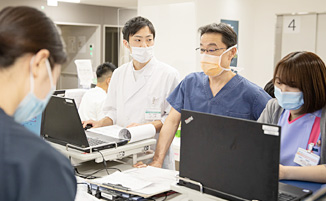
At hospitals and clinics, we work with doctors, nurses, pharmacists, and others to provide nutritional management and other services tailored to the medical conditions of individual patients.

We provide school lunches at elementary and junior high schools to meet the needs of growing children. We are also in charge of "Shokuiku"(eating education classes) and provide consultation on food allergies, etc.
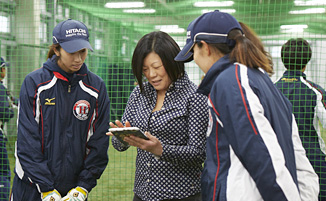
We provide nutritional support to top athletes, junior athletes, people who enjoy sports, and children in order to improve their competitive performance.
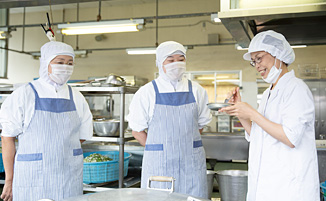
We are entrusted with part of the daily meals of workers and students, and support their daily health promotion by preparing menus and providing nutritional information.
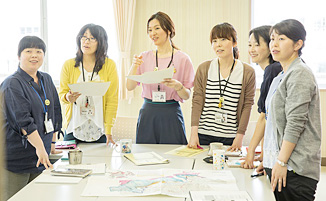
Working at prefectural government offices, city halls, and public health centers, we plan and implement policies to improve the health of local residents and provide consultation to residents.

Our work includes nutritional guidance and cooking instruction for people who are sick or in need of nursing care, advice for healthy people, and teaching cooking classes.
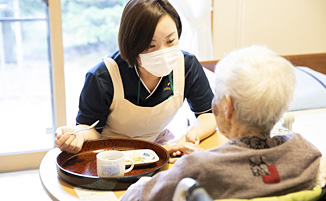
At welfare facilities, we consider and serve meals suitable for each elderly or disabled person, and perform nutritional and health management.
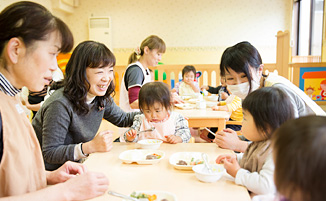
At nursery schools and children's homes, we provide weaning and infant food menus necessary for children's growth, and increase their interest in food.
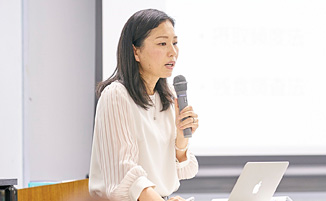
We are responsible for training registered dietitians and dietitians. We also build evidence through research at universities and companies.
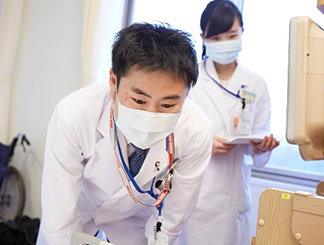
In cooperation with the national government and related organizations, we train and produce registered dietitians and dietitians with advanced knowledge and skills in specialized areas. 2021, we are currently promoting certification in five specific areas: specific health guidance, enteral nutrition, home visitation, sports nutrition, and food allergy, as well as cancer, kidney disease, diabetes, feeding and swallowing rehabilitation, and home nutrition, We are promoting accreditation in five specific fields: oncology, renal disease, diabetes, feeding and swallowing rehabilitation, and home nutrition.
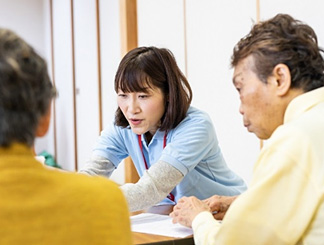
Nutrition Care Stations are community nutrition centers open to the general public, with 4,973 registered dietitians and dietitians at 356 locations nationwide. They provide a variety of services related to food and nutrition, including daily nutrition counseling, specific health guidance, and cooking classes.
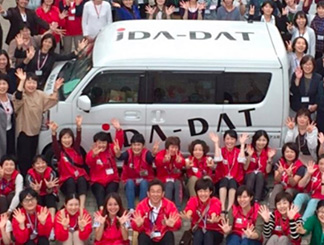
Following the Great East Japan Earthquake in 2011, the Japan Dietetic Association-Disaster Assistance Team (JDA-DAT) was established to provide support to areas affected by frequent earthquakes and torrential rains. As of March 31, 2021, JDA-DAT has trained and registered 831 JDA-DAT leaders and 2,917 JDA-DAT staff members to cover activities in all regions of Japan.